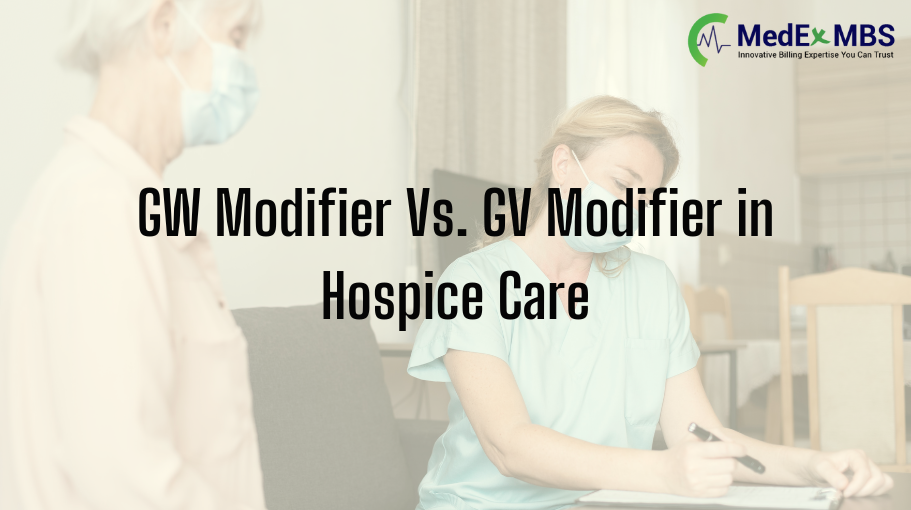GW Modifier Vs. GV Modifier in Hospice Care

Are you facing challenges in receiving payment for healthcare services rendered to hospice patients due to the improper application of GW or GV modifiers? Don’t be concerned, we are here to assist you! Grasping the significance of the GW Modifier and GV Modifier is crucial for accurate hospice billing and preventing claim rejections. In this guide, we will elucidate all the essential information regarding these two vital billing codes, the usage of GW versus GV Modifiers, and their impact on your claims. However, before delving into the details, let us briefly discuss the concept of hospice care and the importance of these modifiers. What is Hospice Care? Hospice care refers to specialized medical care aimed at supporting patients with terminal illnesses, such as those with incurable or irreversible conditions, by prioritizing comfort and quality of life. It encompasses the provision of medications, medical attention, and equipment to alleviate pain and minimize suffering during the final phases of life. Hospice services are provided by a dedicated team of physicians, nurses, and caregivers who ensure that patients and their families receive emotional, physical, and spiritual support. Typical hospice care services include pain management, symptom control, counseling, and round-the-clock assistance. The objective is to enable patients to live peacefully and comfortably during their remaining time, whether at home, in a hospice facility, or in another care setting. Hospice care is not focused on curing the illness but rather on enhancing the quality of life for both patients and their families. A hospice care team may comprise the following members: Clergy or other counselors Home health aides Hospice physician Nurse Practitioners Social workers Trained volunteers Speech, physical, and occupational therapists, if necessary The patient’s physician The team undertakes numerous responsibilities to assist and care for patients with terminal illnesses, including: Managing the patient’s pain and recognizing symptoms Offering emotional support Supplying medications, medical supplies, and equipment Educating caregivers on how to care for the patient Providing additional assistance, such as speech or physical therapy when necessary Facilitating short-term inpatient care when pain or symptoms escalate beyond manageable levels at home Offering grief support Where is Hospice Care Provided? Hospice care is offered in a variety of environments, such as hospitals, specialized hospice facilities, nursing homes, or the patient’s residence. A significant number of patients prefer the solace of receiving care in their own homes. Individuals who are enrolled in Medicare are eligible for hospice services if their physician assesses that they may have six months or less to live due to a terminal illness. This assessment is based on the patient’s medical history and overall health condition. Although it is difficult for physicians to accurately forecast life expectancy, patients who exceed the six-month mark can temporarily exit hospice care and re-enter later if their physician re-certifies their eligibility. Medicare beneficiaries have the option to transition from standard Medicare coverage to hospice care, which emphasizes symptom management and ensuring that patients are comfortable and treated with dignity during this period. When individuals on Medicare opt for hospice care, they can receive assistance with costs related to their illness through Medicare Part B. However, this does not include services provided by their primary doctor or nurse practitioner. Here are several requirements for the provision of hospice care services. They include: Patients (Medicare Beneficiaries) are required to opt for hospice care instead of standard Medicare benefits, and their terminal illness must be validated by both their attending physician and the medical director or a physician member of the IDG (Interdisciplinary Group). Nurse practitioners (NPs) serving as the attending physicians for the patient are not permitted to certify or recertify the terminal illness. Specific hospice care must be organized before the delivery of any services to terminally ill patients, and the care services must correspond with the established care plan. It is crucial to keep in mind that predictions regarding life expectancy are not always precise. Utilizing GV and GW Modifiers in Hospice Care Grasping the significance of GV and GW modifiers is vital for accurate hospice billing. These modifiers serve to clarify claims for services associated with a hospice patient’s care, thereby aiding in ensuring they are processed and reimbursed appropriately. Below is an overview of essential information regarding the application of GV and GW modifiers for hospice claims. Hospice Modifier GV The GV modifier for hospice claims is critical when billing Medicare for services rendered to hospice patients. This modifier is applicable when care services pertain to the patient’s terminal condition, yet the attending physician or nurse practitioner (NP) is not directly employed or compensated by the hospice agency. For example, if a physician delivers medical care to a hospice patient and is not associated with the hospice, but the services relate to the patient’s terminal illness, Medicare can still reimburse the physician. To guarantee proper reimbursement, the provider must incorporate the GV modifier on the claim when submitting it to Medicare. Key considerations when incorporating Modifier GV: Incorporating a GV modifier into claims will be advantageous for non-hospice physicians. The application of GV modifiers by hospice contractors is appropriate only if the patient qualifies for hospice care. Nevertheless, the attending physician must not be affiliated with the hospice as an employee. Hospice Modifier GW The GW Modifier plays a crucial role in billing Medicare for services rendered to hospice patients that are not related to their hospice care. This modifier is applicable when a patient eligible for hospice receives treatment for conditions that are not associated with their hospice diagnosis. For instance, if a patient in hospice care requires medical services for an unrelated issue, the healthcare provider must apply the GW Modifier when filing claims with Medicare. This specifically pertains to services delivered by physicians who are neither employed by nor compensated by the hospice. Essential points to remember regarding the GW Modifier: Apply the GW modifier to signify that the services rendered to a hospice patient are outside
